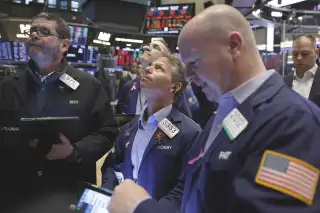Will the Fed Cut Interest Rates Soon? Wall Street Can't Make Up Its Mind

After last week’s quarter-point interest rate hike amid a meltdown in the banking sector, all eyes are on the Fed’s next move.
But Wall Street experts are divided about what exactly that move might be — and whether, after nine consecutive rate hikes, rate cuts might be coming this year.
It’s not clear which approach will serve the economy best. Higher interest rates slow down economic growth, which is important when the economy is overheating and consumer prices are rising too fast — like they have been for more than a year, with above-average inflation.
High interest rates make it more expensive for banks to borrow from each other, and that extra expense trickles down to consumers, too. They also weigh on the prices of financial assets like stocks and bonds.
The real problem is that if the Federal Reserve hikes rates too much or leaves them too high for too long, it risks damage to the economy. Then again, if rate hikes are paused too soon, the Fed risks falling behind in its battle with inflation.
Recession could prompt rate cuts soon
In a blog post last week, strategists from TD Securities said that while they believe a too-hot labor market will prompt the Fed to raise rates twice more (in May and June), the central bank will begin cutting rates at the end of the year as the economy enters a recession. “We maintain our call that rate cuts will commence at the December meeting,” the strategists wrote.
Some think those cuts could come even sooner. “I predict the Federal Reserve will be cutting rates substantially soon,” Jeffrey Gundlach, chief investment officer DoubleLine Capital, tweeted last week. The market agrees: Data from the CME FedWatch Tool shows a roughly 37% chance of a rate cut at the central bank’s July meeting, and a 63% chance of a cut at the September meeting.
While conventional wisdom says that lower rates tend to give the stock market a boost, some have argued that the market's expectations of rate cuts are not actually a good thing.
“Rate cuts would actually be negative for the stock market,” Todd Sohn, managing director of technical strategy at Strategas Securities, recently told Bloomberg. That's partially because rate cuts will be prompted by a struggling economy, which could very likely prompt further losses for stocks. Cuts could hit growth stocks especially hard, Sohn added.
‘Sticky inflation’ could mean no rate cuts
Some experts, on the other hand, believe that those market expectations are out of line with the Fed’s likely path, in large part due to stubbornly high inflation.
In a client note this week, strategists from BlackRock said they don’t anticipate any rate cuts this year. “That’s the old playbook when central banks would rush to rescue the economy as recession hit,” they wrote. “Now they’re causing the recession to fight sticky inflation — and that makes rate cuts unlikely.”
“We’re still a long, long way” off from the Fed’s 2% inflation target, Jay Bryson, Wells Fargo Securities chief economist, recently told CNBC. As a result, he anticipates that the central bank will keep rates high “for a long period of time” despite other pressures on the economy.
Federal Reserve chair Jerome Powell echoed this view in a press conference following the rate hike announcement last week. Given the hot labor and slow reduction of the inflation rate, “participants don’t see rate cuts this year,” he said. “They just don’t.”
More from Money:
How a TikTok Ban Could Boost Stock Prices for Meta, Alphabet and Snap
How the Banking Crisis Could Help Fix Inflation — Without More Interest Rate Hikes
The Fed Just Raised Interest Rates Again Despite Recent Bank Failures. Here's What It Means for You